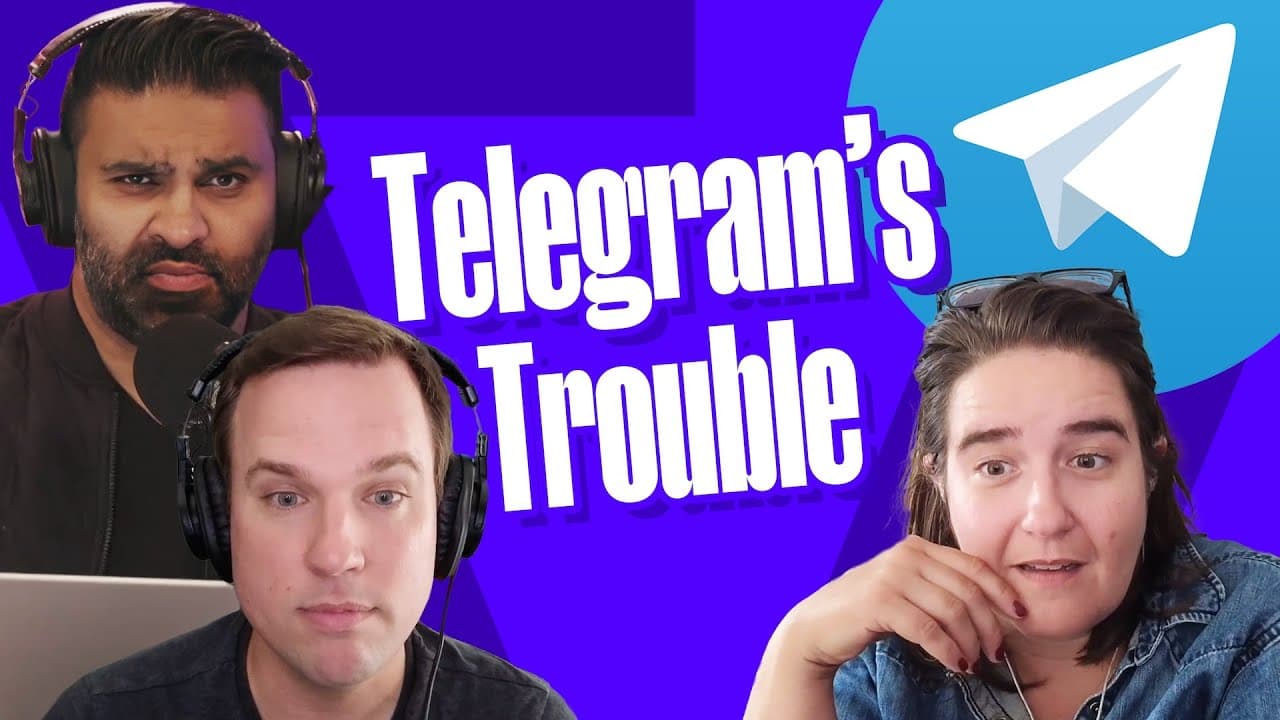The problem with Telegram | The Vergecast
31 Aug 2024 (over 1 year ago)

Intro (0s)
- David Pierce, Alex Cranz, and another person are having a conversation. (35s)
- The speakers discuss reading Calvin and Hobbes to children. (44s)
- One speaker recounts their child's reaction to Calvin and Hobbes and their own experience reading comic strips to their child. (1m41s)
Gadget Season and Legal News (2m14s)
- It is two weeks until Apple's iPhone event. (2m17s)
- Reading PDFs from governments around the world is a large part of the job of the speakers. (3m35s)
- Readwise Reader is the best way to read PDFs on an e-ink screen, but it is not well integrated with e-ink reading devices. (4m32s)
Telegram's Legal Troubles (6m31s)
- Telegram is not end-to-end encrypted by default, unlike platforms like iMessage or Signal. Telegram groups and standard chats are not encrypted, and the platform has the technical capability to see content shared within these chats. (9m35s)
- Telegram has no content moderation, which is a policy decision rather than a technical limitation. This has led to the platform becoming a haven for illegal content, including child sexual abuse material (CSAM), despite researchers reporting its prevalence. (14m33s)
- Telegram has designed its data storage in a way that makes it difficult for law enforcement agencies to obtain information, even with warrants or subpoenas. This involves storing data in multiple jurisdictions, making it practically impossible to gather all necessary data for investigations. (15m16s)
Yelp sues Google (34m13s)
- Yelp is suing Google for antitrust violations, alleging that Google prioritizes its own services in search results, harming Yelp and similar companies. (35m17s)
- Yelp's lawsuit argues that Google's prioritization of its own services in search results has negatively impacted Yelp and other companies like Trip Advisor. (36m3s)
- A 10-year-old's death after participating in the "Blackout Challenge" has resulted in a lawsuit against TikTok, despite the platform not creating or promoting the challenge. (44m9s)
Content Moderation and Free Speech (44m30s)
- Content moderation laws from Texas and Florida were brought to the Supreme Court, which found them to be poorly considered, particularly in their potential impact on platforms other than Facebook. (45m2s)
- The Supreme Court maintained that curating content is protected as first-party speech under Section 230. (45m24s)
- While Section 230 protects platforms from being held responsible for user-generated content, the act of moderating and presenting that content is considered the platform's own speech and is therefore protected by the First Amendment. (45m42s)
TikTok's Legal Challenges (45m49s)
- The court acknowledges that platforms like TikTok engage in protected First Amendment speech when they use algorithms to curate content, similar to creating compilations. (46m13s)
- The court argues that because these algorithms are considered the platform's own speech, they can be held liable for the content they recommend. (46m29s)
- This ruling implies that while the government may not be able to dictate content moderation rules, platforms could face legal consequences for the content promoted by their algorithms. (46m53s)
California's AI Safety Bill (47m3s)
- The California State Assembly passed an AI safety bill (SB 1047) that, if signed into law, would place regulations on AI development and deployment. (48m18s)
- The bill mandates that companies must be able to shut down AI models quickly, protect against unsafe modifications, and implement testing procedures to assess the risk of harm. (53m42s)
- While some companies support the bill, others argue that it is unnecessary and could stifle innovation. (50m11s)
Lightning Round (54m3s)
- Google's attitude towards AI has shifted, becoming more willing to accept a degree of risk in its AI products. (58m15s)
- ESPN has launched a feature that allows users to easily find where to stream sporting events, acting as a TV Guide for streaming services. (1h3m35s)
- The release of the new Dyson Airwrap, a hair curler with Bluetooth connectivity and an app, raises questions about the necessity of smart features in such devices. (1h10m21s)